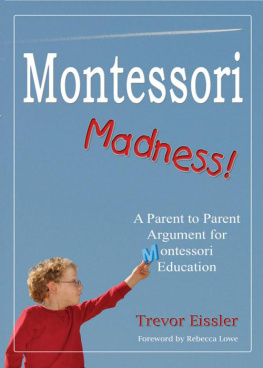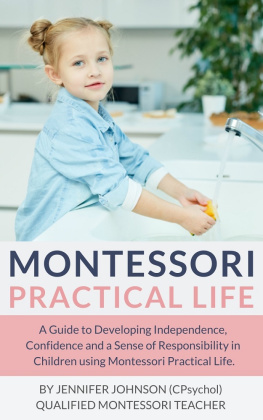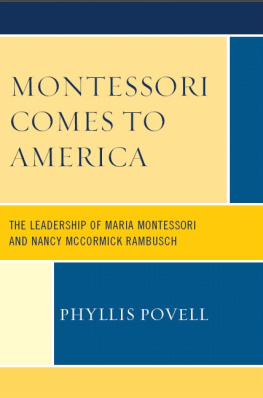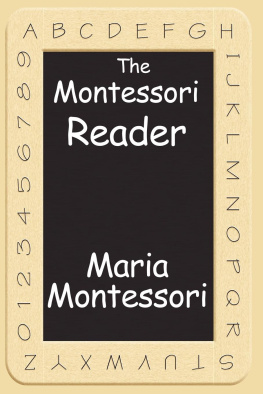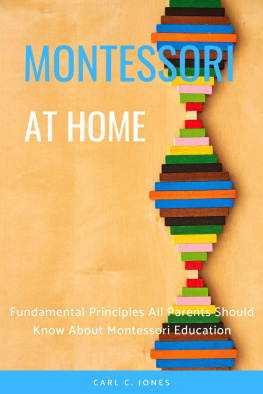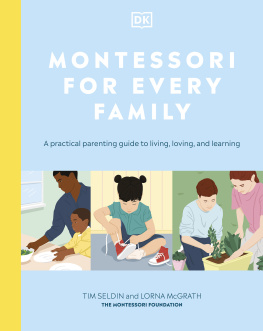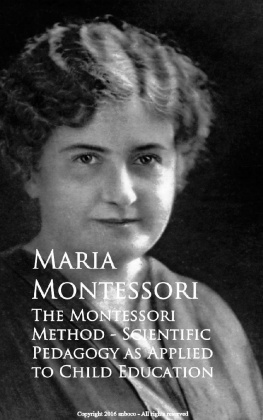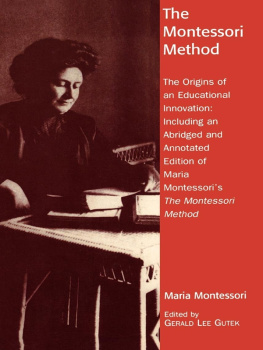


Sevenoff, LLC
Copyright 2009 by Trevor Eissler
All rights reserved.
Requests to reprint all or part of Montessori Madness! A Parent to Parent
Argument for Montessori Education should be addressed to:
Sevenoff, LLC
P.O.Box 1459
Georgetown, TX 78627
info@sevenoff.com
Printed in the United States of America.
Order directly from the publisher and join the discussion:
www.montessorimadness.com.
Cataloging-in-Publication Data
Eissler, Trevor
I. Montessori method of education II. Montessoriparent participation III.
Child development IV. Montessori, Maria, 1870-1952
LB 1029 M75 E83 2009 371.392 EI
ISBN 978-0-9822833-0-1
Library of Congress Control Number 2009901854
The author is grateful for the following permissions:
For excerpts from The Secret of Childhood by Maria Montessori, copyright
1966 by Fides Publishers, Inc. Used by permission of Ballantine Books, a
division of Random House, Inc. For an excerpt from Einsteins Mistakes: The
Human Failings of Genius by Hans C. Ohanian. Copyright 2008 by Hans C.
Ohanian. Used by permission of W.W. Norton & Company, Inc.
eBooks created by ebookconversion.com
ACKNOWLEDGEMENT
This book was my project.
But over time, one by one, others went out of their way to offer assistance, suggestions, insight, constructive criticism, and encouragement. Their efforts dramatically improved the content and quality of the message. As the project progressed, I slowly realized, and came to deeply appreciate, that what was once a solitary endeavor had become a community effort. The final result is a much more effective appeal to the reader because of that cooperation. It is yet one more testament to the power of the principles Maria Montessori held dear. I must thank Robin Eissler, Susan Eissler, Ara Eissler, Adrian Eissler, Vicki Rees, Susan Cavitch, Lacy Murphy, Rebecca Lowe, Judith Kemper, Jody French, Chrissy Davol, Barbara Gordon, and Mindy Reed. I am grateful to be a part of such a wonderful community.
AUTHORS NOTE
This book deals extensively with teachers and students. The pronouns she for teacher and he for student were chosen instead of the more proper he or she for both. These were the pronouns selected by Maria Montessori in her writing, so to follow her choice seemed in the best interest of clarity and continuity.
To Oliver, Ellie, and Evan:
The sky is the limit. Or is it? Lets go find out.
Contents
Foreword
Rebecca Lowe
Executive Director, Community Montessori School
I was a Montessori teacher for 22 years. One of my students was a four-year-old girl who could not remember the sounds of the alphabet. We followed the Montessori practice of writing before reading. Every day we made words and stories with a movable alphabet. The little girl not only began to read that year, she went far beyond, composing story after story with vivid illustrations. She became proficient at reading and writing at age five, andwhats moreshe discovered she loved words!
Another student couldnt keep still. This boy ricocheted off the walls and treated the beautiful wood materials roughly, as if they were disposable toys. I presented lesson after lesson to him, observing to see which activities helped him to focus. The puzzle map of the world finally caught his interest. When he saw that he could construct his own paper map of the world by meticulously pricking a pin along the edge of the small wooden continents, he became committed to finishing a simple map and then to making similar maps for each continent. By pin-pricking around every country for each continent, he created seven intricate and beautiful mapsand emerged a calm, focused, and happy child.
These children are not unique. There are many others just like them, happily learning every day. In my Montessori classroom, I saw countless children, some shy, some boisterous, some even unhappy. All experienced transformations as remarkable as the girl and boy described above. They changed over weeks and months to become amazing childrenthemselvesbecause they were given the opportunities and respect needed to grow into eager and self-directed learners. This process continues in Montessori classes worldwide.
At the turn of the twentieth century, Maria Montessori realized that purposeful activity brings concentration, which in turn brings the ability to choose appropriate work for oneself. In my current role as a Montessori school administrator, I see this process begin in our toddler community, progress through the primary classroom, and blossom in the elementary years.
I discovered Montessori principles after one tough year as a public school teacher shook my faith in the field of education. My students were not engaged unless I could provide something outside of their regular school experience. Yet leaving the mandated curriculum was taboo. If we did something innovative, I felt nervous; if I stayed with the prescribed plan, the students went on automatic pilot to do the rote work and wait for the bell. I was just out of college and deeply disappointed with my career choice.
I kept thinking back to the Montessori classrooms I had cleaned at night while working my way through college. Even then, I was captivated by the beautiful rooms and paid as much attention to the materials on the shelves as to the spills on the floors. If a childs work was left out on a rug, I could even see how that exercise was used during the day.
Four years after those night moppings, I contacted my former boss, Donna Goertz. Not only did she remember the college student who had cleaned her school, but she asked me to be an assistant in her elementary classroom at Austin Montessori School. In Donnas class, I saw children learning new skills because they wanted to. I saw the guide (teacher) presenting interesting new lessons to the children in small groups or individually, instead of lecturing to the entire class. I was soon convinced that children could enjoy learning and be eager to research reports or learn division facts.
After this eye-opening experience, I became a trained Montessori guide and spent over two decades leading a primary class of children aged three to six. I saw the combination of exquisite hands-on materials, a mixed-age community, and freedom of choice result in children doing meaningful work with joy. I observed parents begin to make their home environments more child-friendly as they viewed their childrens potential in wonderful new ways.
Now, as Executive Director of Community Montessori School in Georgetown, Texas, one of my most enjoyable duties is to give prospective parents a glimpse into classrooms for children ranging in age from 18 months to 12 years. Our visitors are often surprisedeven captivatedby children at all levels who are following their interests, building skills, and learning to work together. When Trevor and Robin Eissler sat in a classroom in our school, they felt the same awe that countless other observers have felt in Montessori classrooms all over the world. They wanted that experience for their own three children.
Montessori Madness! is Trevor Eisslers story of his familys search for excellence in education. It juxtaposes home and school, freedom and regimentation, joy and fear. Eissler compares how conventional schools and Montessori schools address the same problems and opportunities. He illustrates how Montessori children find learning and activity rewarding in themselves, rendering external rewards unnecessary. Having older children in each classroom as role models fosters inner discipline within the younger children and reduces the need for adult correction. Doing meaningful work within orderly environments encourages responsibility, independence, and confidence and makes outside motivation unnecessary. As Eissler contrasts Montessori and traditional approaches, it is clear that children in traditional schools are given an education that often underestimates and diminishes them.
Next page
